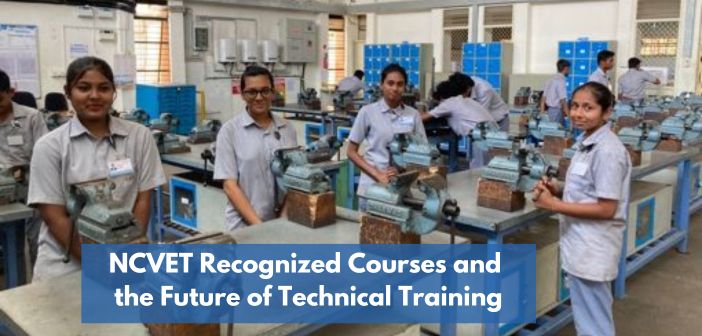NCVET certification provides students with a valuable credential that validates their skills and makes them competitive in the job market. It also offers students flexibility and caters to their individual learning needs,” says Mr. Shankar G, Head – Faculty Department, NTTF.
To learn more about benefits for students to enrol in NCVET recognized courses, the importance of applied learning, simultaneous learning from multiple institutions and more, we spoke with Mr. Shankar G, Head – Faculty Department, NTTF.
Below are a few excerpts from our conversation. You can watch the full video on our YouTube channel.
Q. With NCVET recognition for NTTF as Awarding Body and Assessment Agency what are some of the key benefits for students who enrol in different courses?
A. Students seeking credibility in the job market understand the importance of obtaining certification from a reputable and recognized institution. The National Council for Vocational Education and Training (NCVET) plays a pivotal role in this regard as a government body entrusted with establishing and maintaining standards for vocational training across India.
NCVET ensures that the curriculum and skill sets imparted through vocational training programs remain aligned with industry requirements and stay up-to-date of evolving trends. Collaborating with esteemed awarding bodies, NCVET facilitates the issuing of certificates to students upon successful completion of their training programs, thereby validating their acquired skills and enhancing their employability prospects.
Benefits for students to enrol in NCVET recognized courses
- Industry Recognition: NCVET certification is recognized by industries, increasing a student’s employability.
- Flexibility: Students can pursue skilling through various modes – traditional institutions, online learning, or even while working in the industry.
- Modular Learning: Students can choose to learn multiple skills simultaneously from different institutions and get NCVET certification for each.
- Multiple Entry/Exit: Students enrolled in diploma programs can exit with a certificate after completing a specific duration, allowing them to work and then return to complete the program later.
- Credit Transfer: NCVET facilitates transfer of credits earned through various learning methods, reducing redundancy.
Through its comprehensive framework, NCVET serves as a cornerstone in empowering students with industry-relevant skills and credentials essential for thriving in the competitive job market landscape. Now we have all these under one umbrella, and this is where NTTF is now got benefited with this for training students.
Q. What are the key benefits of a diploma program compared to a traditional four-year degree?
A. Before the implementation of NEP 2020, the focus of education was primarily on the curriculum and meeting standardized testing requirements, typically aligned with the 11th or 12th-grade standards. This approach persisted for many years, disregarding the evolving demands of industries and the need for specialized skills in various sectors like carpentry, machine operation, or programming in languages like Python.
However, NEP 2020 brought about a paradigm shift by integrating vocational and educational training (VET) to bridge this gap. It aimed to combine theoretical knowledge with practical skills, a departure from the previous approach that attempted to cover a broad spectrum of subjects without depth.
Through the National Skills Qualifications Framework (NSQF) and other initiatives like the Credit Framework, NEP 2020 facilitates the alignment of vocational skills with formal education. This alignment is crucial for students as it enables them to pursue education that meets industry standards and equips them with relevant skills for the job market.
Moreover, NEP 2020 introduced flexibility in learning pathways, allowing students to tailor their education to their career goals and personal circumstances. Unlike the rigid structures of the past, where students had limited options and faced challenges in balancing education with life events, the new framework offers multiple entry and exit points.

For instance, students can pursue a diploma or degree program and choose to exit after completing specific stages, earning certificates that hold value in the job market. This flexibility is particularly beneficial for those facing financial constraints or family responsibilities, as it allows them to pace their learning according to their needs.
Q. What is the 10+3+3 system in India and how does it benefit students’ employability and readiness for the workforce, while also providing opportunities for further education and specialization?
A. Many students oscillate between apprehension and anticipation regarding their future paths. Apprehension stems from uncertainty about career choices, while anticipation involves envisioning desired career trajectories and planning educational journeys accordingly.
The 10+3+3 system, particularly the three-year diploma component, plays a pivotal role here. Unlike traditional routes, the diploma segment emphasizes practical skill development, with about 70% of the curriculum focused on hands-on training. This equips students with industry-relevant skills essential for employment.
Upon completing the diploma, students can choose to enter the workforce or pursue further education, such as a B.Tech degree. The practical experience gained during the diploma phase helps students make informed decisions about their career paths, aligning their interests and abilities with specific industries or domains.
The streamlined nature of the 10+3+3 system offers efficiency and flexibility, enabling students to enter the workforce sooner and with relevant skills. This empowers them to navigate the complexities of the job market and realize their career aspirations effectively.
Also read: How NTTF’s NCVT certification program is shaping students’ futures through inclusive education
Q. Is there anything else you wish to share?
A. Recently implemented as part of the “One Nation, One Student” policy, every student now needs to have a unique identification card containing biometric and address information. This card, known as the Automated permanent academy account or registry (APPAR) ID serves as a crucial component of the education system. Linked to a digital platform, the APPAR ID facilitates the aggregation of certifications obtained from various institutes, whether online or offline, into the Academic Bank of Credit (ABC). This system enables seamless credit transfer and integration of education and skill training institutions under a unified umbrella, promoting efficiency and transparency in the education sector.
Subscribe to our YouTube channel for more updates:
Subscribe on YouTube



I need assistance
plumber General jab